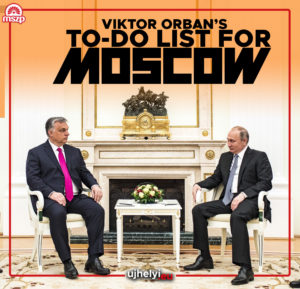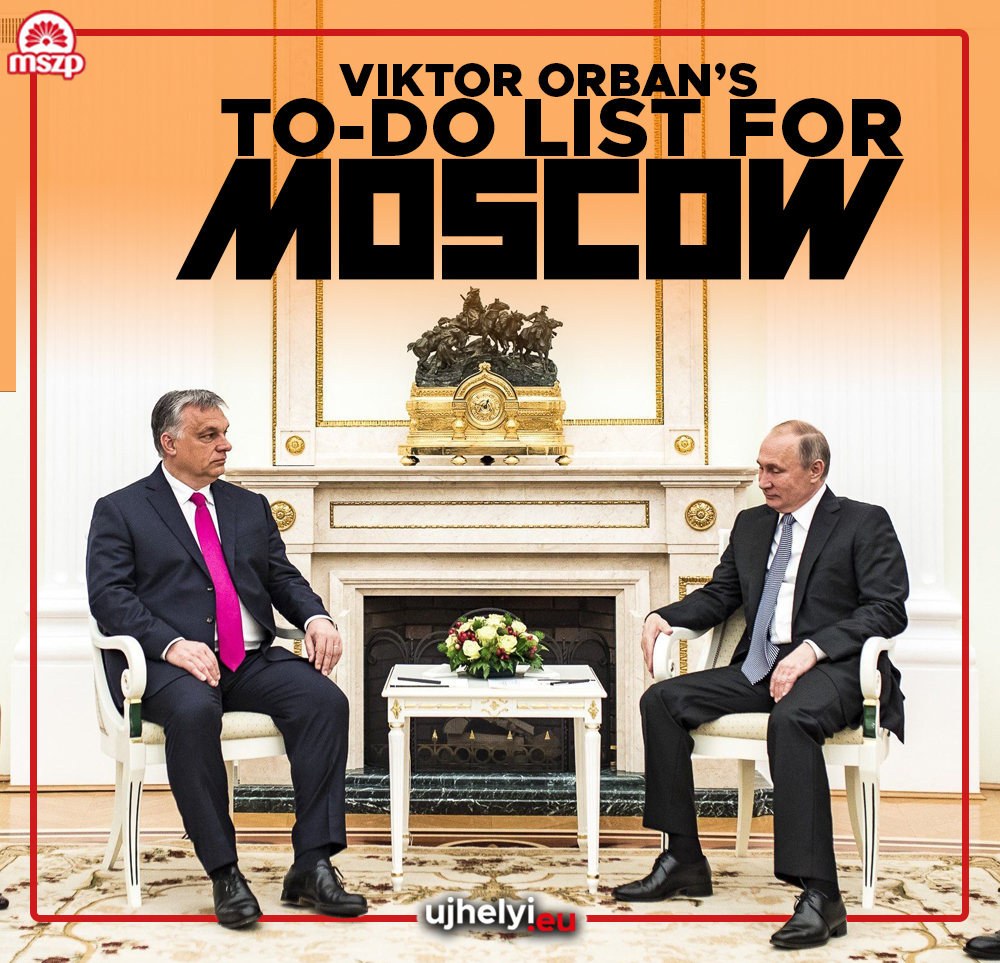Published: 31.1.2022
 Despite the extremely delicate conflict in Ukraine, and despite calls and warnings from the united opposition and the European Union, the Prime Minister of Fidesz will hold talks with Russian President Vladimir Putin in Moscow tomorrow. Unfortunately, Viktor Orbán cannot be expected to bang on the table of the Russian President on sensitive and important issues, even though not so long ago they represented strong values. For example, the European programme of Fidesz („Yes, Hungary can do more – 2009”), which is still in force today, states that „if Europe allows sovereign states in its neighbourhood to fall victim to undisguised imperial despotism, it will also endanger its own security; the European Union can only act effectively as a united front against Russia, which is once again openly proclaiming its expansionist ambitions.”
Despite the extremely delicate conflict in Ukraine, and despite calls and warnings from the united opposition and the European Union, the Prime Minister of Fidesz will hold talks with Russian President Vladimir Putin in Moscow tomorrow. Unfortunately, Viktor Orbán cannot be expected to bang on the table of the Russian President on sensitive and important issues, even though not so long ago they represented strong values. For example, the European programme of Fidesz („Yes, Hungary can do more – 2009”), which is still in force today, states that „if Europe allows sovereign states in its neighbourhood to fall victim to undisguised imperial despotism, it will also endanger its own security; the European Union can only act effectively as a united front against Russia, which is once again openly proclaiming its expansionist ambitions.”
Since the current Hungarian Prime Minister, still in office for a short time, has not taken into consideration any pleas or warnings, I have summarized in a few points the most important issues that Viktor Orbán should definitely put on the negotiating table if he has the opportunity to meet President Putin. Let us hope that the President of Fidesz will have the courage and the advocacy skills to be able to come home with real results on these issues, and that his visit to Moscow in this situation will therefore have at least a minimal impact.
1. Demand firmly that the Russian state speed up the European licensing of the SputnikV vaccine through fair disclosure and cooperation, rather than obstruction and delay. Hundreds of thousands of Hungarians are currently facing costly restrictions because the Russian vaccine they have been administered is not yet part of the EU COVID certificate. In this context, we would like to make it clear that in the vaccine plant in Debrecen, currently under construction, we will only produce vaccines authorized by the EU, i.e. until SputnikV has EMA approval, contrary to our previous intentions, we do not want any.
2. Firmly bring to the attention of the Russian side that the Hungarian government considers Russia’s call for a return to the 1997 military situation in the post-Soviet region in connection with the Ukrainian conflict, which would essentially mean the termination of Hungary’s membership in NATO, as a serious breach of Hungary’s national sovereignty. It must be made clear to the Russian side that Hungary is a member of the North Atlantic Treaty Organisation (NATO) and the European Union, and that it therefore has the interests of this community at heart.
3. State firmly to the leader of Russia that we will not tolerate any external intervention in the Hungarian elections in April. If Russia were to try to manipulate the Hungarian elections by any means, the Hungarian government would not let it go without consequences. At the same time, we call on President Putin to make sure that Russia immediately gives up its practice of influencing elections and internal affairs in EU Member States, citing the coup in Montenegro as an example.
4. Take a strong stand against the obstruction and state-directed harassment of the opposition in Russia. Make it clear to President Putin that the Hungarian government, as the guardian of democratic European values, is perplexed and concerned when Russian opposition figures are surveilled abroad, attempted to be assassinated, and possibly even successfully assassinated.
5. Strongly condemn the violence in the Belarus region and any Russian support or involvement in it. The Hungarian government sends a clear and unequivocal message to the Russian leadership that it finds it unacceptable that on the eastern borders of our alliance it artificially maintains in power a political leader who was presumably elected by fraud and who has imposed violent military force against his own citizens in breach of all human rights standards.
6. We strongly demand the withdrawal of full diplomatic immunity for the staff of the Russian International Investment Bank. This gives the impression that the institution in Budapest is in fact a Russian spy centre with free access to the European Union. President Putin would obviously agree that, in a tense international conflict, even the appearance must be avoided that the Fidesz government is helping the Russian secret service to gain a foothold in the EU in return for some kind of supposed quid pro quo.
MEP István Ujhelyi
31.01.2022.
